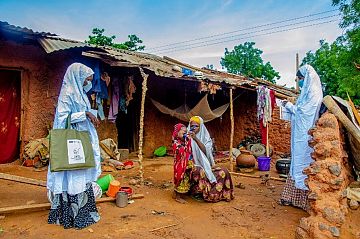Seasonal malaria chemoprevention – a fantastic story of progress and success
29 September 2020
Malaria Consortium was pleased to participate in a timely webinar earlier today: ‘Getting the most from seasonal malaria chemoprevention: New learnings from Niger, Nigeria and Benin’.
The webinar, orchestrated by Population Services International (PSI), brought together implementers operating in these countries to share their learnings from this year’s delivery with an audience of over 200 international health experts.
In his welcome address, Dr Pedro Alonso, Director of the World Health Organization’s Global Malaria Programme spoke of seasonal malaria chemoprevention (SMC) as a fantastic story of progress and success thanks to the concerted efforts of partners scaling up this life-saving intervention.
“As Director of the Global Malaria Program of WHO, SMC is one of the highlights of our malaria global effort. It is a fantastic example of the translation from research into policy into application and scalability, and reaching millions of children in one of the areas of the world – in fact, the area of the world – where under-five mortality is highest and where malaria is a main contributor to that mortality.”
The emergence of COVID-19 as a global health crisis raised questions as to if and how SMC could be delivered as planned this year. Malaria Consortium has been a leading implementer of SMC since WHO issued its recommendation to scale up the intervention in 2012 and has continued to deliver SMC safely during the COVID-19 pandemic and in line with government strategies. Malaria Consortium’s Olatunde Adesoro, Programme Director for SMC in Nigeria outlined how implementing SMC this year in the context of COVID-19 was achieved in practice – from global partner collaboration and stakeholder engagement to procurement of resources and training adaptations, and reflected on the achievements, challenges and lessons to be learnt for the future particularly in the provision of safe essential health services amid a pandemic.
Presenters from PMI Impact Malaria and Catholic Relief Services (CRS) also spoke to improved efficiency of campaign delivery through digitisation in Benin and the introduction of integrated malnutrition screenings in Niger respectively.
The event served to demonstrate the opportunities of SMC to further improve malaria control outcomes alongside additional interventions and showcased the programme’s adaptive and scalable attributes. Dr Alonso highlighted these attributes as he spoke of how the benefits of SMC could and should be felt in regions beyond the Sahel in the future.
“SMC is a great success story and we must not just preserve it but nurture it. I believe also, adapt it as per the principles of the High Burden, High Impact (HBHI) initiative […] Let’s be clear, there are no conceptual reasons why SMC should not be used in other parts of the continent. In the spirit of adapting our response to what the epidemiology looks like, we should be able to deploy our tools and our mixes of interventions to all the areas where significant benefit could be achieved.”
Our thanks to Population Services International (PSI) for coordinating this webinar as well as moderating it alongside Medicines for Malaria Ventures (MMV). A recording of the webinar will be added to this article as soon as it is available.
Find out more about our SMC work.
Latest news
- Malaria Consortium honoured by Ugandan government for contribution to combat malaria23rd April 2024
- International summit calls for AMR accountability in public health interventions21st March 2024
- Global SMC community celebrates new milestone at SMC Alliance Annual Meeting in Nigeria6th March 2024
- Scaling up key interventions could halve pneumonia-related childhood mortality13th February 2024
- Malaria Consortium and eGov Foundation join Mozambique’s national malaria programme to digitalise seasonal malaria chemoprevention campaigns8th February 2024
- World’s first malaria vaccine rollout launched in Cameroon22nd January 2024